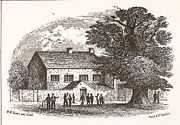
William Hunter (Protestant martyr)
Encyclopedia

Marian Persecutions
The Marian Persecutions were carried out against religious reformers, Protestants, and other dissenters for their heretical beliefs during the reign of Mary I of England. The excesses of this period were mythologized in the historical record of Foxe's Book of Martyrs...
burnt to death in Brentwood at the age of 19 on March 27, 1555 on Ingrave Road. He had lost his job in London as a silk-weaver because he refused to attend the Catholic mass, despite an order that everyone in the City of London had to attend, and had come to live with his parents in Brentwood, but got into a dispute when discovered reading the Bible for himself in Brentwood Chapel. He refused to accept the Catholic
Catholic
The word catholic comes from the Greek phrase , meaning "on the whole," "according to the whole" or "in general", and is a combination of the Greek words meaning "about" and meaning "whole"...
dogma
Dogma
Dogma is the established belief or doctrine held by a religion, or a particular group or organization. It is authoritative and not to be disputed, doubted, or diverged from, by the practitioners or believers...
of transubstantiation
Transubstantiation
In Roman Catholic theology, transubstantiation means the change, in the Eucharist, of the substance of wheat bread and grape wine into the substance of the Body and Blood, respectively, of Jesus, while all that is accessible to the senses remains as before.The Eastern Orthodox...
according to which the bread and wine of the communion
Eucharist
The Eucharist , also called Holy Communion, the Sacrament of the Altar, the Blessed Sacrament, the Lord's Supper, and other names, is a Christian sacrament or ordinance...
become the body and blood of Jesus
Jesus
Jesus of Nazareth , commonly referred to as Jesus Christ or simply as Jesus or Christ, is the central figure of Christianity...
.
He was taken before Antony Browne
Anthony Browne (justice)
Sir Anthony Browne QS was a British justice. He came from a family of lawyers; his father, Sir Wistan Browne, was a barrister of the Middle Temple, and three of his uncles served as benchers there, one of whom was Sir Humphrey Browne, a justice of the Court of Common Pleas...
, then the local Justice, but later Chief Justice of the Common Pleas
Chief Justice of the Common Pleas
The Court of Common Pleas, also known as the Common Bench or Common Place, was the second highest common law court in the English legal system until 1880, when it was dissolved. As such, the Chief Justice of the Common Pleas was one of the highest judicial officials in England, behind only the Lord...
, but refused to retract his position. Hunter was then sent to Bishop Bonner
Edmund Bonner
Edmund Bonner , Bishop of London, was an English bishop. Initially an instrumental figure in the schism of Henry VIII from Rome, he was antagonized by the Protestant reforms introduced by Somerset and reconciled himself to Roman Catholicism...
in London
London
London is the capital city of :England and the :United Kingdom, the largest metropolitan area in the United Kingdom, and the largest urban zone in the European Union by most measures. Located on the River Thames, London has been a major settlement for two millennia, its history going back to its...
. He resisted both threats and bribes—Bonner offered to make him a Freeman
Freedom of the City
Freedom of the City is an honour bestowed by some municipalities in Australia, Canada, Ireland, France, Italy, New Zealand, South Africa, Spain, the United Kingdom, Gibraltar and Rhodesia to esteemed members of its community and to organisations to be honoured, often for service to the community;...
of the City of London
City of London
The City of London is a small area within Greater London, England. It is the historic core of London around which the modern conurbation grew and has held city status since time immemorial. The City’s boundaries have remained almost unchanged since the Middle Ages, and it is now only a tiny part of...
and give him £40—and was eventually returned to Brentwood to be burnt. He was the first Essex martyr of the reign of Mary Tudor.
The site is now Brentwood School, which was founded by Antony Browne in 1558, under a grant from Queen Mary (not, as some believe, as a penance when Queen Elizabeth I
Elizabeth I of England
Elizabeth I was queen regnant of England and Ireland from 17 November 1558 until her death. Sometimes called The Virgin Queen, Gloriana, or Good Queen Bess, Elizabeth was the fifth and last monarch of the Tudor dynasty...
came to the throne). The Martyr's Elm was grown on the spot of Hunter's incineration.
The site is marked by a plaque with the inscription

